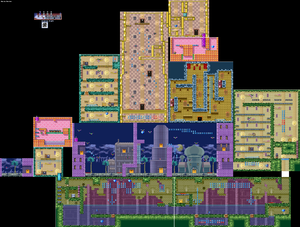Arabian Night: Difference between revisions
m (Text replacement - "\|type(\d+)=([^\n]+) " to "") |
m (Text replacement - "(\[\[:?Category:[T-Z][^\]\|\n]+[^t]) Levels(\]|\|)" to "$1 levels$2") |
||
| Line 54: | Line 54: | ||
{{WL4}} | {{WL4}} | ||
[[Category:Wario Land 4 | [[Category:Wario Land 4 levels]] | ||
Revision as of 17:25, September 3, 2021
Arabian Night is the second level of the Sapphire Passage in the Game Boy Advance game Wario Land 4. It is an Arabian-themed level, set in an abandoned Arabian palace and features flying carpets in which Wario can fly on to reach other places. This level is separated into two areas: an inside and an outside. Doors throughout the level link each inside and outside area. Mayubirds and Onomī are enemies that are unique to this level. This is also the only level where Togemasuku are found in all game modes. Inside the palace, enemies can change from Togemasuku, Beezleys, and Miniculas, depending on which tubes Wario jumps through, which allows him to get Keyzer. This level's CD is called The Errand and once collected, it can be played in the Sound Room.
Time given in different modes
The time given to escape the level after hitting the switch varies between game modes.
Gallery
Early screenshot of Arabian Night
The Errand album cover
Media
| File info 3:06 |
Names in other languages
| Language | Name | Meaning | Notes |
|---|---|---|---|
| Japanese | アラビアンナイト[?] Arabian Naito |
Arabian Night | |
| Chinese | 阿拉伯之夜[1] Ālābó zhī Yè |
Arabian Night |
Trivia
- Arabian Night resembles Agrabah from the 1992 Disney animated film, Aladdin. Its name may stem from one of the songs in the film.
References
- ^ 阿快尔瑞斯 (July 19, 2014). 【完结】【童年游戏】瓦力欧寻宝记流程 (6P). Bilibili. Retrieved February 3, 2017.





